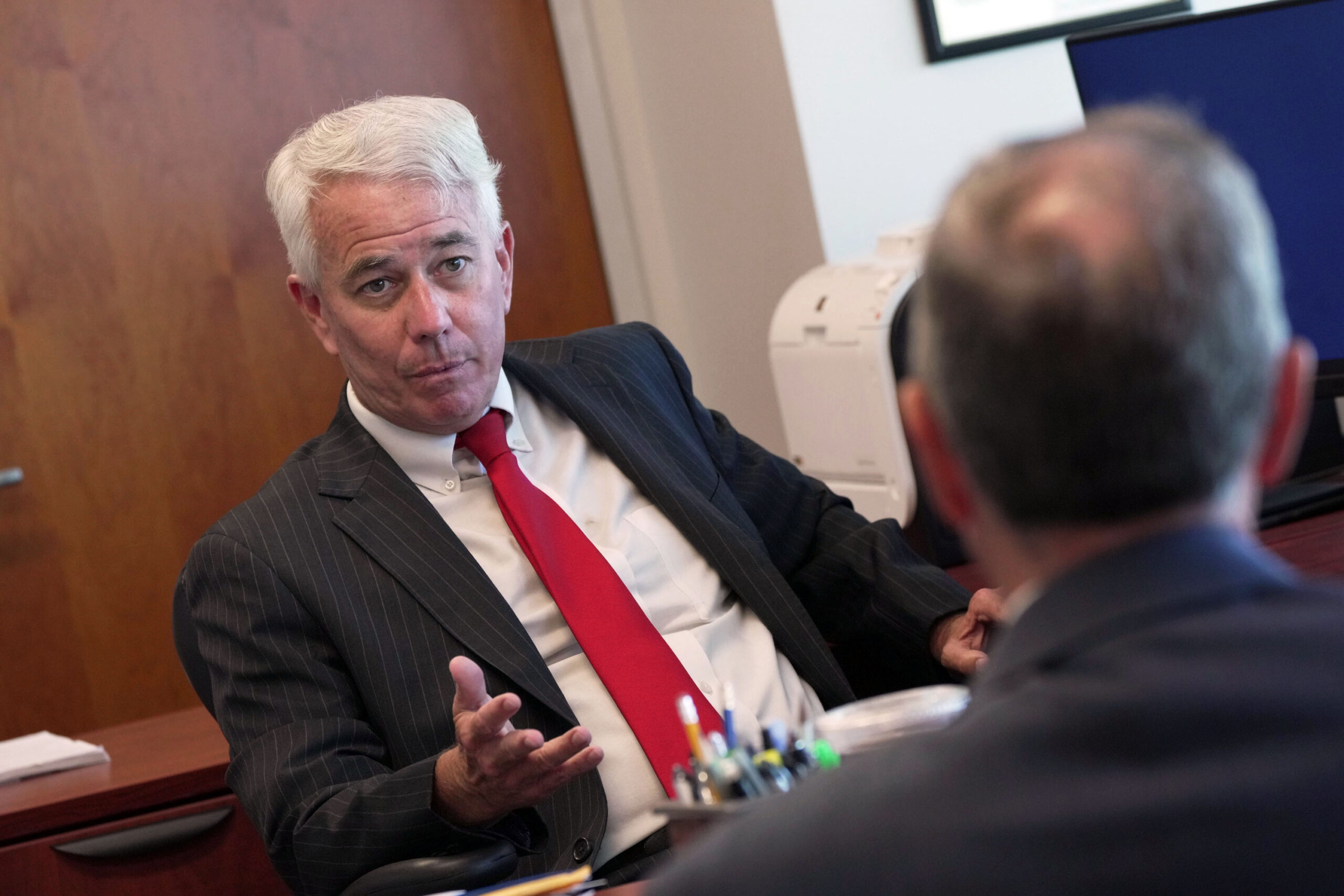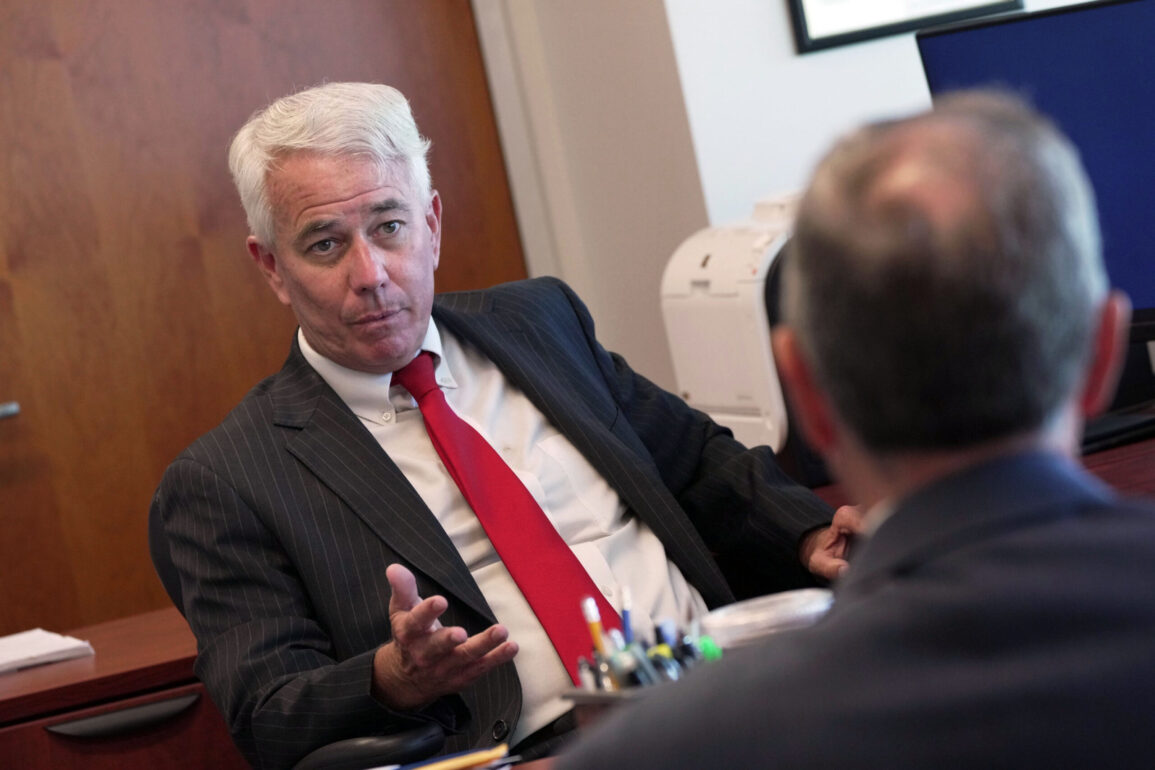In 2019, the year Gov. Bill Lee took office, Tennessee law enforcement made more than 20,000 juvenile arrests. By last year, that number had fallen about a third to 14,000, according to Tennessee Bureau of Investigation data.
Some leaders might tout those numbers as evidence of an effective approach to juvenile crime, especially since the overall rate of serious crime also declined eight percent during that same period.
But Lee and fellow Republican House Speaker Cameron Sexton have used a special session called in the wake of The Covenant School shooting to argue that juvenile crime is a problem that requires putting more youth offenders in the adult system, alarming advocates.
Those advocates point to data showing juvenile crime has been declining for years, not just in Tennessee, but nationally.
Sexton points to recent an increase in overall crime in Memphis as evidence that the state needs new, tougher laws for youth offenders. He blamed uptick on new Shelby County District Attorney Steve Mulroy, the first Democrat elected to that position in decades.
The debate over some of the proposed laws shows the messy ways that narratives and data can clash in debates over criminal justice policies, especially when centering around the line between children and adults. Meanwhile, calls for gun control from protestors at the capitol have been mostly ignored or actively silenced.

In his official proclamation announcing the special legislative session, Lee laid out the types of bills that would be allowed. They included legislation related to mental health resources and school safety, among other areas. But Lee also mentioned juvenile justice legislation, including a measure that would increase the transfer of some juvenile defendants to the adult criminal system, implement “blended” adult and juvenile court sentences for youth offenders and limit the expungement of juvenile records. Lawmakers, including Sexton, introduced corresponding legislation.
“There’s a lot of crime going on with juveniles in our state, and so we need to look at toughening juvenile laws,” Sexton told the Tennessee Firearms Association before the start of the session, according to NPR.
The data would seem to show that juvenile crime is decreasing in Tennessee. Juvenile arrests fell faster than overall crime during the 10 years between 2013 and 2022, the most recent year data is publicly available. And in cities like Memphis and Nashville, the drop in juvenile arrests is even more pronounced.
In 2013, there were 28,915 juvenile arrests in Tennessee, but just 13,700 in 2022, a 53% decrease.
At the same time, juveniles have made up a shrinking fraction of all arrests for serious offenses, classified as “Group A” crimes, which include murder, rape and aggravated assault. Juveniles represented about 11% of those arrests in 2013, but just 8% in 2022.
This has happened as the overall crime rate has fallen as well. Between 2013 and 2022, the rate of Group A crimes per 100,000 people fell 20% in Tennessee, according to the TBI. Nashville had a nearly identical drop in the crime rate during that period.
Memphis, however, had a relatively stable crime rate, until 2022, when it jumped nearly 20% over 2021. However, juvenile arrests by Memphis Police continued to fall, despite the overall increase.
In response to questions about the data related to legislative efforts to increase juvenile transfers to the adult system, Sexton provided The Lookout with TBI data showing Shelby County juvenile crimes from July 2022 to July 2023. He said the data showed a sudden increase in juvenile crime since Mulroy took over as Shelby County District Attorney on September 1, 2022.
“When you’ve got a soft on crime DA, what do the criminals want to do? Criminal activities,” Sexton said.
“We’re not sitting here saying anything different than people in Shelby County and Memphis are saying,” Sexton said, citing calls by Rev. Kenneth T. Whalum to deploy the National Guard to Memphis to help deal with crime.
The data Sexton provided showed a nearly 80% increase in serious offenses committed by juveniles between the start of July 2022 and the end of September 2022, the first month Mulroy was the county’s top prosecutor.
But after Sexton provided those figures, The Lookout reviewed corresponding data from previous years. And that data showed nearly that exact same 80% increase was present between July and September in 2021 and 2022, presumably because of a return to school. (The same jump was noticeably absent in the 2020 data, when schools were closed). That would seem to indicate a seasonal pattern unrelated to who the county’s top prosecutor is.
It’s worth noting that the majority of crimes are not solved and don’t lead to arrests. If those crimes were committed by juveniles who were never caught, they would be reflected in overall crime data, but not juvenile arrest numbers.
However, statewide clearance rates – or the proportion of crimes which lead to a corresponding arrest – have remained mostly stable between 36 and 42 percent over the decade that juvenile crime has declined, according to TBI data.
Taken together, it seems safe to say that Tennessee continues to see a drop in juvenile crime, despite what some politicians are saying, said Joshua Rovner, director of youth justice at the nonprofit The Sentencing Project.
“There are always people who think that our system isn’t tough enough, and the solution to our problems, real and imagined, is to make the system more tough,” Rovner said.
Clearance rates have ticked downward in Tennessee’s two largest cities, and in Nashville in particular. In 2013, Nashville police cleared 47.7% of serious crimes. By 2022, that number had fallen to just 25%. In Memphis, clearance rates fell from 27 to 18 percent over that time.
When clearance rates rose in some of those intervening years, juvenile arrests continued to fall, suggesting a slide in juvenile crime, not just juvenile arrests.
‘Throwing away their chances of being successful’
The overall downward trend in youth arrests isn’t unique to Tennessee or its largest cities.
Research has shown that juvenile crime has been steadily decreasing across the United States and other developed countries over the last two decades. This decline has surprised some experts who saw the growing juvenile crime rates of the late eighties and early nineties as a harbinger of a world of “super predators” and unchecked violence.
In the U.S., New Zealand, Australia, the Netherlands and England “rates of juvenile offending have declined by between 40% and 80% from recent peaks,” according to a 2023 paper. “Many of these countries have recorded particularly steep decreases since about 2008.”
Research has also shown that recidivism rates are lower for offenders who enter the juvenile system, which is more focused on rehabilitation and treatment than the adult system. Science has also shown that the young people’s brains continue to develop into their early 20s, with important implications for the development of better decision making and impulse control skills in the years following adolescence.
There’s all these things that we could be doing that I think would help us lower the crime rate even more, and then also produce better outcomes for young people and their families. And I would love to be focusing on those instead of talking about reverting to this really punitive mindset that was popular 30 years ago.
– Jasmine Miller, Youth Law Project
Davidson County Juvenile Judge Sheila Calloway believes the data shows that transferring youth offenders to the adult system is “throwing away their chances of being successful when they are released.”
She noted that the number of transfers to the adult system are down, but attributed the decline to fewer young people committing crimes.
She also noted that two instances of high-profile murders in Memphis were allegedly committed by former youth offenders who had been transferred to the adult system. Cleotha Abston, who has pleaded not guilty to murdering teacher Eliza Fletcher, was transferred to the adult system when he was 16 in 2000 after a lengthy series of crimes.
Ezekiel Kelly, who is accused of killing three people and wounding three others in a rampage that shut down Memphis, was transferred to the adult system when he was 17.
“The adult system released them into a situation where they were able to reoffend,” Calloway said.
As amended, Sexton’s bill would mandate that some youth who have committed a serious crime – including rape, robbery, and any crime involving the use of a deadly weapon – face an additional three or four year sentence in the adult prison system when they turn 19.

The legislation also creates an opportunity for youth to avoid this additional sentence if they stay out of trouble. Within four months of their 19th birthday, the offender would face a hearing that would determine if they engaged in any of the following: committed another delinquent act, done anything to create a “substantial safety risk,” failed to meet conditions of supervision, failed to attend school regularly with passing grades, or failed to find try to obtain a job if they graduated from high school.
Critics of the bill have said these standards are too vague, creating serious due process questions. They also don’t even mention the possibility of attending college.
Some of the other proposed bills appear to be a solution in need of a problem. For example, several bills have been introduced that would transfer older youth to the adult system if they were charged with theft of a firearm. However, the Department of Children’s Services has said it currently has no one in its custody charged with theft of a firearm, according to legislative fiscal notes.
Part of the reason that there is no one who fits that description in DCS custody could be how difficult it is to catch youth stealing firearms, as stolen guns typically change hands almost immediately. It also may be in part because the legislature has allowed them to be legally left in cars.
Guns stolen from cars in Nashville increased a whopping 600% since the Tennessee legislature passed a law making it legal to store guns in cars in 2013. That year, there were 206 guns stolen out of cars in the city, a number that increased to 1,378 last year, the Tennessean reported earlier this month.
As part of his special session proclamation, Lee proposed “measures to encourage the safe storage of firearms” – like tax breaks for gun safes and safety devices – in the special session, but explicitly banned “penalties for failing to safely store firearms.” Democrats have proposed such penalties in the past.
Of course, declining juvenile crime does not mean that juvenile crime isn’t still a problem, one that hurts people, families and communities. But reducing it further would seem to require continuing the evidence-based path that focuses more on rehabilitation that the state pursued over the past decade, said Jasmine Miller, a Nashville-based attorney with the nonprofit Youth Law Project.
“There’s all these things that we could be doing that I think would help us lower the crime rate even more, and then also produce better outcomes for young people and their families,” Miller said. “And I would love to be focusing on those instead of talking about reverting to this really punitive mindset that was popular 30 years ago.”
What hasn’t seemed to be working over the last decade is the state’s approach to gun violence, particularly gun violence against juveniles. Deaths from gun violence in Tennessee increased 66% between 2011 and 2021, according to a recent analysis of CDC data by nonprofit Sycamore Institute. Tennessee had the seventh highest gun homicide rate among all states that reported data in 2021.
Firearms were responsible for 85 youth deaths in Tennessee 2021, according to the state’s health department, passing motor vehicle accidents as the state’s leading cause of death for children.
That total is nearly quadruple the 22 children that died from firearms in 2012.
SUPPORT NEWS YOU TRUST.
This post was originally published on this site be sure to check out more of their content.







